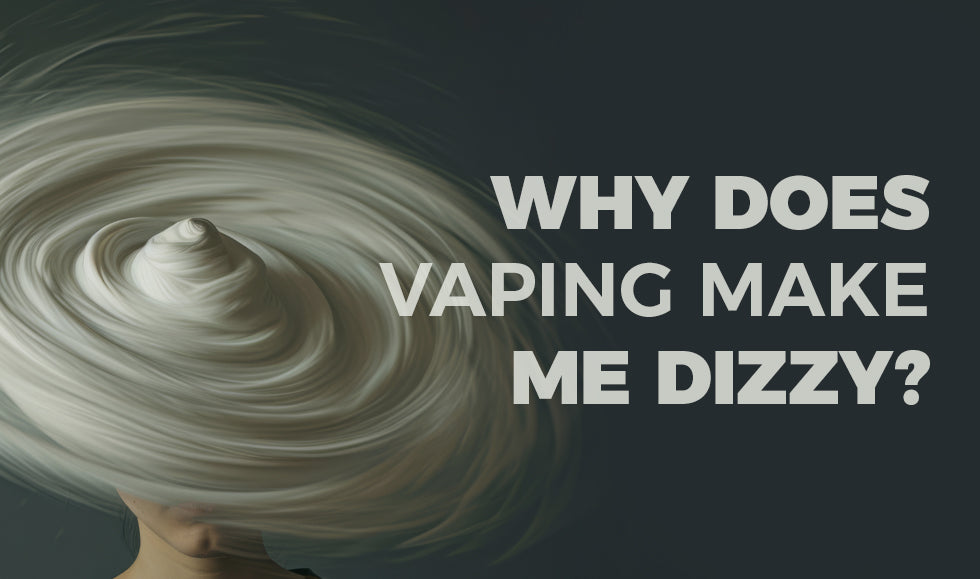In recent years, vaping has become a ubiquitous phenomenon, touted as a better alternative to traditional smoking. But amidst the allure of tantalizing e-liquids and a plethora of vape hardware, some users find themselves asking, "Why does vaping make me dizzy?" Reports of dizziness among vapers have sparked curiosity and concern, prompting a closer examination of this issue. So, let's delve into the reasons behind vaping-induced dizziness and explore strategies to prevent and alleviate it.
Why Does Nicotine Make You Dizzy?
Before tackling the question "Can nicotine make you dizzy?" let's understand vaping basics. Vaping includes inhaling and exhaling vapor from devices like mods or vape pens. Unlike cigarettes, vaping heats e-liquid containing nicotine, flavorings, and chemicals, rather than burning tobacco to produce smoke.
Now that we have explained what vaping is, it is time to cover nicotine, as this is one of the primary reasons vaping can cause dizziness. Nicotine is a stimulant, but it can also cause side effects like dizziness, especially in non-smokers or those new to vaping. When inhaled, nicotine enters the bloodstream rapidly through the lungs and reaches the brain within seconds. It stimulates the adrenal glands to release adrenaline, which can elevate blood pressure, increase heart rate, and lead to dizziness.
The severity of being placed into a nicotine dizzy feeling can vary depending on the nicotine concentration of the e-liquid and the frequency of vaping. Higher concentrations can exacerbate the dizzy feeling (aka nicotine high dizzy). New users could be more susceptible as their bodies are not yet accustomed to nicotine’s effects. Over time, regular users might develop a tolerance, potentially reducing the incidence of dizziness.
Individual differences in biology can also affect how one reacts to vaping. Factors such as body weight, metabolic rate, and overall health can influence how quickly nicotine is metabolized and how the body reacts to the components of e-liquids. Those with cardiovascular issues may experience more pronounced dizziness, as nicotine can exacerbate these conditions.
Also, since e-liquids are primarily composed of propylene glycol (PG) and vegetable glycerin (VG), which serve as bases to hold nicotine and flavorings, some individuals may experience dizziness as a reaction to these substances. To be more specific:
- PG, in particular, can cause dehydration and dry throat, which can indirectly lead to feelings of dizziness.
- VG generates thicker vapor, which can be intense for some users. This can lead to coughing or a light-headed feeling, particularly with deep or frequent inhalation.
Dizziness may also result from overusing a certain vaping device, thus potentially leading to nicotine poisoning, particularly if using high-nicotine products. Symptoms of nicotine overdose include nausea, headache, and severe dizziness. This is particularly risky with more powerful vaping devices that deliver larger amounts of nicotine more quickly. Users, especially those who vape frequently or who use high-power devices, should be mindful of their intake to avoid these negative effects.
How To Stop Dizziness From Vaping
Now, if you're experiencing dizziness from vaping, it's crucial to address this symptom seriously as it can be indicative of various underlying issues. With that being said, here are some steps you can take to help manage and potentially stop the dizziness:

- Cease Vaping Immediately: If you feel dizzy while vaping, stop immediately. This is the most effective way to halt any immediate adverse effects.
- Hydration: Dehydration, which can occur with vaping, can exacerbate dizziness. Make sure you drink plenty of water.
- Nicotine Levels: Consider the nicotine content of your vape. Again, as we just covered in detail, nicotine is a stimulant and can cause dizziness, especially in high doses or if you are not used to it. So, you might need to switch to a lower nicotine concentration or eliminate it altogether.
- Ventilation: Ensure you vape in a well-ventilated area. Inhaling concentrated vapor in enclosed spaces can increase the risk of dizziness.
- Eat Well: Low blood sugar can also lead to dizziness. Ensure you eat regularly and maintain a balanced diet.
- Check Your Device: Sometimes, the issue could be with the device itself. Make sure it is working correctly and not overheating or delivering an unusually high dose of nicotine.
- Consult a Healthcare Professional: If dizziness persists, it's important to consult a healthcare professional. They can provide a comprehensive evaluation to rule out other health issues that might be causing your symptoms.
How Long Does Dizziness Last After Vaping?
Dizziness after vaping varies in duration, depending on factors like nicotine tolerance, consumption amount, and health conditions. Usually, it subsides within minutes to an hour after stopping. If severe or persistent, seek medical attention, as it may indicate a serious issue. Frequent dizziness after vaping might suggest vaping isn't suitable. Consider alternative nicotine intake methods or cessation altogether.
Final Non-Dizzy Vaping Thoughts
While vaping can be a preferable alternative to smoking for some, it is not without risks, including dizziness. Understanding these factors can help users make informed decisions and adopt safer vaping practices. Always consider personal health conditions and, as we simply cannot stress this enough, consult with your doctor/physician when experiencing adverse effects like dizziness from vaping, especially with e-liquids or pre-filled cartridges/pods that contain nicotine.





